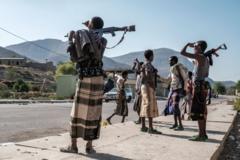In a surprising move, the National Election Board of Ethiopia announced the deregistration of the TPLF due to its failure to hold a general assembly. This action comes amid existing fractures within the party, which has historically been a dominant political force in the country, and has been unable to unite amid internal disputes. The TPLF governs an interim administration in Tigray following the Pretoria peace agreement that sought to end two years of brutal conflict which claimed countless lives and displaced millions.
The party's leadership has appealed to the African Union for intervention, citing the ban as a "serious threat" to the peace deal which demands recognition of legitimate political opposition and emphasizes dialogue to address disputes. TPLF deputy chairman Ammanuel Assefa highlighted the grave implications of this decision, warning it could hinder the vital peace process and further destabilize the region.
Tensions surrounding the implementation of the peace agreement, including the return of displaced persons, have led to fears of renewed violence in Tigray. International observers, including officials from the United States, United Kingdom, and the European Union, have called for restraint and urged that the cycle of violence must not be allowed to continue.
With the nation’s political landscape shifting and the specter of conflict looming, all eyes are on the upcoming elections—and whether they can be conducted smoothly as Ethiopia navigates its troubled past.
The party's leadership has appealed to the African Union for intervention, citing the ban as a "serious threat" to the peace deal which demands recognition of legitimate political opposition and emphasizes dialogue to address disputes. TPLF deputy chairman Ammanuel Assefa highlighted the grave implications of this decision, warning it could hinder the vital peace process and further destabilize the region.
Tensions surrounding the implementation of the peace agreement, including the return of displaced persons, have led to fears of renewed violence in Tigray. International observers, including officials from the United States, United Kingdom, and the European Union, have called for restraint and urged that the cycle of violence must not be allowed to continue.
With the nation’s political landscape shifting and the specter of conflict looming, all eyes are on the upcoming elections—and whether they can be conducted smoothly as Ethiopia navigates its troubled past.




















